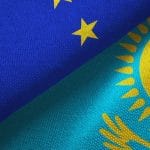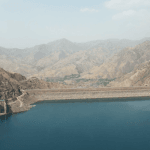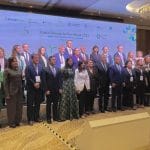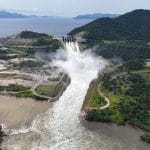ATHENS – Russian Prime Minister Mikhail Mishustin visited Athens on March 24 to discuss bilateral relations with Greek Prime Minister Kyriakos Mitsotakis, a conversation that covered topics ranging from culture, economy, transport and energy and Russia’s participation in a military parade to mark the 200th anniversary of Greece’s 1821 revolution against the Ottoman Turks and the country’s Independence Day, which is celebrated on March 25.
After the Kremlin announced that Russian President Vladimir Putin has no plans to visit Athens, Greece extended an invitation to Mishustin.
“When it comes to Greece-Turkey relations, and the effect of the Russian factor, I think the main reason Mishustin will visit Greece is to symbolically demonstrate that Russia was a factor in Greece’s Independence and improves the image of Russia in Greece after it was tarnished by the (2018) Prespes Agreement (that resolved a long-standing dispute over the name of North Macedonia),” Constantinos Filis, director of research at Institute of International Relations, told New Europe in a phone interview on March 22, referring to Moscow’s attempt to interfere in Greece’s domestic affairs, following the agreement reached between Greece and the Republic of Macedonia, under the United Nations’ auspices.
“Russia, and its inability to influence the course of developments with regards to the Greek economy, as was expected in either in 2010 and 2015 and especially (because of) its close and very close and very cordial relationship, which takes on strategic characteristics, with Turkey are, of course, issues of concern. And I suspect that Mishustin wants, first of all, to demonstrate that Russia was an important part of the Greek War of Independence in 1821 and second, he wants to kind of improve Russia’s image in Greece, especially with regards to its strategic relations with Turkey,” Filis said.
“Russia and the Greek diaspora in the former Russian Empire played a key role in the revolution. Imagine what the perception would have been if Greece had not extended its invitation to the Russian premier instead of Putin given that our relations right now are not at their best. They are probably at a very low level. So, it’s logical to invite Russia for a celebration of the Greek revolution of 1821,” Filis said.
“However, after (The 1827 Battle of) Navarino (where an allied combined naval force from Britain, France, and Russia defeated the Turks and helped guarantee Greece’s independence) it’s not that easy to find instances in our modern history where Russia was a positive contributor to our interests.
Let’s look, for instance, at the Treaty of San Stefano of 1878, which actually gave birth to Bulgarian irredentism and in many other instances cooperation between Kemal (Ataturk) and (Vladimir) Lenin. In so many instances, our Russian friends have not been so friendly towards Greece, but that’s politics. For me, someone who did his PhD on Russia, what piqued my interest is that it took many decades for the average Greek to realize that Russia is not any friendlier to Greece than any other state only because of our common Orthodox bonds. It’s a state that has its own interests and serves its own interests. The Russians are no pro-Greek per se simply because we are both Orthodox,” Filis told New Europe.
Russia has blamed Patriarch Bartholomew of Constantinople for the loss of Hagia Sophia (in Istanbul): “The famous remark by (Kremlin spokesman Dmitri) Peskov who said now it’s easier for Russians to visit Hagia Sofia free, I mean they won’t have to pay a ticket. This is highly indicative of how cynical and pragmatic Russian foreign policy has been throughout the years even when Russia uses Orthodoxy or the Russian Patriarchate as a vehicle for fulfilling its foreign policy objectives,” Filis said.
Peskov reportedly said in a radio interview that Turkey’s decision to reconvert the 6th-century Hagia Sophia cathedral, which is a UNESCO World Heritage Site and had been a museum since 1934, to a mosque would not harm relations between Moscow and that he understood the move was ‘an internal affair’.
“There were rather expensive tickets to Hagia Sophia, but now there will be no tickets, admission will be free. In this regard, our tourists will win,” Peskov was quoted as saying, sparking a furious response from the Greek government.
Filis said Greece needs to find a balance in its relations with Russia. “Relations won’t be restored, of course, simply because the premier was invited to our parade. But it’s a sign from our part that we want to find some common denominators with Russia and, if you look at it from the bigger picture, Greece should have done that because Russia is a power in the Eastern Mediterranean that cannot be ignored,” Filis said, adding, “that does not mean that we are going to change our strategic orientation or slip to Russia or the East as Turkey is doing. But in finding a balance with Russia and finding a balance in Greek-Turkish relations and the role of Russia is something that Greece should seek to attain”.







